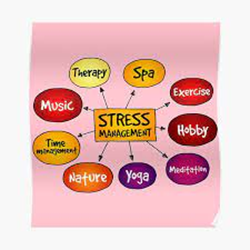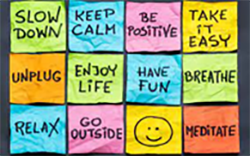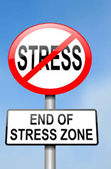October 2022
Karen Ensle EdD, RDN, FAND, CFCS
Rutgers Cooperative Extension of Union County
Today, stress and change often are thought of as the same thing. Stress is a physiological and psychological response to situations the body and mind find to be overwhelming. We often ask ourselves how we should manage stress. Manage how you live with these ten tips to feel less stressed:
- Use guided meditation. Guided meditation is a great way to distract yourself from the stress of day-to-day life. There are many guided meditations available on the internet that can help you find 5 minutes of centered relaxation.
- Practice deep breathing. Deep breathing is a great way to reduce the activation of your sympathetic nervous system, which controls the body's response to a perceived threat. Deep breaths taken in to a count of five seconds, held for two seconds and released to a count of five seconds, can help activate your parasympathetic nervous system, which helps reduce the overall stress and anxiety you may be experiencing.
- Maintain physical exercise and good nutrition. Physical exercise and nutrition are two important components in how you respond to stress. When your body is healthy, your mind can be healthy and vice versa. Physical exercise is proven to be a great stress reliever and helps to improve your overall quality of life. Nutrition is important as stress can deplete certain vitamins, such as A, B complex, C and E. Maintaining proper nutrition not only helps your body feel better, but your mind as well, which allows you to better combat stress.
- Manage social media time. Spending time on social media sites can become stressful, not only by what we might see, but also because the time you are spending on social media might be best spent g visiting with friends, being outside enjoying the weather, or reading a great book.
- Connect with others. Humans are social beings. You need to have connections with people to feel supported. Finding a sense of community—whether at work, with a religious organization, or through shared activities, such as organized sports—is important to your well-being. Enjoying a shared activity allows you to find support and foster relationships that can be supportive in difficult times.
- Eat Healthy. Eat and drink to optimize your health and reduce stress by drinking less alcohol and eating proper portion sizes. Caffeine can compound the effects of stress. Consuming a healthy, balanced diet can help to provide energy and disease-fighting nutrients. Make sure you are drinking enough water and eating plenty of fruit, vegetables, whole grains, lean meat, fish, poultry, and low-fat dairy.
- Stop using tobacco and nicotine products. People who use nicotine often refer to it as a stress reliever, however, nicotine places more stress on the body by increasing physical arousal and reducing blood flow and breathing.
- Exercise regularly. In addition to having physical health benefits, exercise has been shown to be a powerful stress reliever. Consider non-competitive aerobic exercise, strengthening with weights, or movement activities like yoga or Tai Chi, and set reasonable goals for yourself. Aerobic exercise has been shown to release endorphins—natural substances that help you feel better and maintain a positive attitude.
- Study and practice relaxation techniques. Taking the time to relax every day helps to protect the body from the effects of stress. Take small steps and choose from a variety of techniques, such as deep breathing, imagery, progressive muscle relaxation, and mindfulness meditation. There are many online and smart phone apps that provide guidance on these techniques; although some entail purchase costs, many are available free of charge.
- Reduce triggers of stress. If you are like most people, your life may be filled with too many demands and too little time. For the most part, these demands are ones we have chosen. You can free up time by practicing time-management skills like asking for help when it's appropriate, setting priorities, pacing yourself, and reserving time to take care of yourself.




